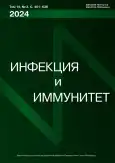Влияние Tritrichomonas spp. на иммунную систему мышей линии Muc2–/– после антибиотикотерапии
- Авторы: Гончарова Е.П.1, Бец В.Д.1, Макушева Ю.С.1, Литвинова Е.А.1
-
Учреждения:
- Центр технологического превосходства, Новосибирский государственный технический университет
- Выпуск: Том 14, № 3 (2024)
- Страницы: 519-524
- Раздел: КРАТКИЕ СООБЩЕНИЯ
- URL: https://journals.rcsi.science/2220-7619/article/view/262074
- DOI: https://doi.org/10.15789/2220-7619-IOT-16746
- ID: 262074
Цитировать
Полный текст
Аннотация
В то время как патогенные протисты, населяющие репродуктивные пути хорошо изучены, в желудочно-кишечном тракте (ЖКТ) существует конститутивная микробиота протистов, которая является неотъемлемой частью микробиома позвоночных. В настоящее время недостаточно описано влияние протозойных инфекций на иммунную систему хозяина и их потенциальный вклад в нарушение иммунного гомеостаза слизистой оболочки. Протисты, наряду с бактериями и вирусами, являются постоянными представителями микробиоты человека. Основное внимание исследователей сосредоточено на изучении их патогенного влияния в заболеваниях ЖКТ. Однако, их роль в симбиотических отношениях с хозяевами относительно мало изучена. Ранее было показано, что ближайшим человеческим ортологом трихомонады мышей (Tritrichomonas spp.) является трихомонада Dientamoeba fragilis, которая способна вызывать симптомы воспалительных заболеваний кишечника. В настоящее время неясно, являются ли Dientamoeba fragilis и другие виды протистов, такие как Enteromonas spp., Entamoeba dispar, комменсалами, патобионтами или возбудителями заболеваний кишечного тракта человека. Таким образом, информация о мутуалистических отношениях между протистами, микробиотой ЖКТ и иммунной системой мышей могут быть использованы для понимания взаимоотношений хозяина и простейших у человека. Полученные данные позволят оценить потенциальный вклад комменсалов простейших в формировании защитных механизмов слизистой оболочки животных и человека. Ранее нами было показано, что антибиотикотерапия приводит к увеличению количества Tritrichomonas spр. наряду с уменьшением бактерий в кишечнике мышей с мутацией в гене Muc2. Мутация в этом гене приводит к нарушению формирования слизистой оболочки кишечника у мышей. Мыши с мутацией в гене Muc2 могут быть использованы при изучении воспалительных заболеваний кишечника (ВЗК) человека. В настоящей работе мы провели сравнительное исследование иммунологического статуса мышей Muc2–/–, инфицированных трихомонадой Tritrichomonas spp., после проведения антибиотикотерапии в течение 2 недель с последующим подселением мышам Lactobacillus johnsonii и мышей без подселения пробиотических микроорганизмов (самовосстановление). Анализ основных популяций лимфоцитов в крови, селезенке и лимфатических узлах показал, что подселение Lactobacillus johnsonii после антибиотикотерапии приводит к достоверному увеличению по пуляции Т-лимфоцитов в крови и в селезенке, и увеличению количества хелперных Т-клеток в лимфатичес ких узлах мышей Muc2–/– по сравнению с группой мышей без подселения пробиотических микроорганизмов.
Ключевые слова
Полный текст
Открыть статью на сайте журналаОб авторах
Е. П. Гончарова
Центр технологического превосходства, Новосибирский государственный технический университет
Email: betsvd.bio@gmail.com
кандидат биологических наук, младший научный сотрудник Центра технологического превосходства
Россия, 630073, г. Новосибирск, пр. К. Маркса, 20Виктория Дмитриевна Бец
Центр технологического превосходства, Новосибирский государственный технический университет
Автор, ответственный за переписку.
Email: betsvd.bio@gmail.com
младший научный сотрудник Центра технологического превосходства
Россия, 630073, г. Новосибирск, пр. К. Маркса, 20Ю. С. Макушева
Центр технологического превосходства, Новосибирский государственный технический университет
Email: betsvd.bio@gmail.com
младший научный сотрудник интеграционной лаборатории «Биоинженерия»
Россия, 630073, г. Новосибирск, пр. К. Маркса, 20Е. А. Литвинова
Центр технологического превосходства, Новосибирский государственный технический университет
Email: betsvd.bio@gmail.com
кандидат биологических наук, научный сотрудник Центра технологического превосходства
Россия, 630073, г. Новосибирск, пр. К. Маркса, 20Список литературы
- Aquino M.F.K., Hinderfeld A.S., Simoes-Barbosa A. Trichomonas vaginalis. Trends Parasitol., 2020, vol. 36, no. 7, pp. 646–647. doi: 10.1016/j.pt.2020.01.010
- Achasova K.M., Kozhevnikova E.N., Borisova M.A., Litvinova E.A. Fucose Ameliorates Tritrichomonas sp.-Associated Illness in Antibiotic-Treated Muc2-/- Mice. Int. J. Mol. Sci., 2021, vol. 22, no. 19: 10⁶99. doi: 10.3390/ijms221910⁶99
- Baker D.G. Parasites of Rats and Mice. In: Flynn’s Parasites of Laboratory Animals: Second Edition; 2008, pp. 303–397. doi: 10.1002/9780470344552.ch11
- Blinova E.A., Goncharova E.P., Kalmykova G.V., Akulova N.I., Litvinova E.A. Lactobacillus johnsonii modulation of bone marrow-derived dendritic cells generated from mice with null mutation of the Muc2 gene. Medical Immunology (Russia), 2023, vol. 25, no. 3, pp. 587–594. doi: 10.15789/1563-0625-LJM-2831
- Chudnovskiy A., Mortha A., Kana V., Kennard A., Ramirez J.D., Rahman A., Remark R., Mogno I., Ng R., Gnjatic S., Amir E.D., Solovyov A., Greenbaum B., Clemente J., Faith J., Belkaid Y., Grigg M.E., Merad M. Host-Protozoan Interactions Protect from Mucosal Infections through Activation of the Inflammasome. Cell, 2016, vol. 167, no. 2, pp. 444–456.e14. doi: 10.1016/j.cell.2016.08.076
- Phukan N., Parsamand T., Brooks A.E., Nguyen T.N., Simoes-Barbosa A. The adherence of Trichomonas vaginalis to host ectocervical cells is influenced by lactobacilli. Sex. Transm. Infect., 2013, vol. 89, no. 6, pp. 455–459. doi: 10.1136/sextrans-2013-051039
- Phukan N., Brooks A.E.S., Simoes-Barbosa A. A Cell Surface Aggregation-Promoting Factor from Lactobacillus gasseri Contributes to Inhibition of Trichomonas vaginalis Adhesion to Human Vaginal Ectocervical Cells. Infect. Immun., 2018, vol. 86, no. 8: e00907-17. doi: 10.1128/IAI.00907-17
- Spurbeck R.R., Arvidson C.G. Lactobacilli at the front line of defense against vaginally acquired infections. Future Microbiol., 2011, vol. 6, no. 5, pp. 567–582. doi: 10.2217/fmb.11.36
- Stark D., Garcia L.S., Barratt J.L., Phillips O., Roberts T., Marriott D., Harkness J., Ellis J.T. Description of Dientamoeba fragilis cyst and precystic forms from human samples. J. Clin. Microbiol., 2014, vol. 52, no. 7, pp. 2680–2683. doi: 10.1128/JCM.00813-14
- Steinbach E.C., Gipson G.R., Sheikh S.Z. Induction of Murine Intestinal Inflammation by Adoptive Transfer of Effector CD4⁺ CD45RB high T Cells into Immunodeficient Mice. J. Vis. Exp., 2015, no. 98: 52533. doi: 10.3791/52533
Дополнительные файлы








